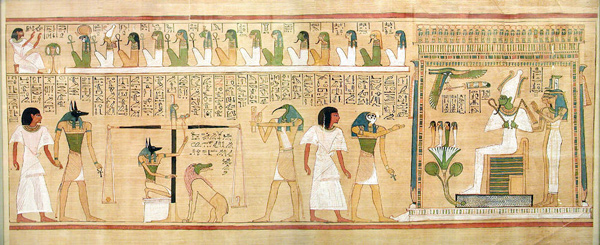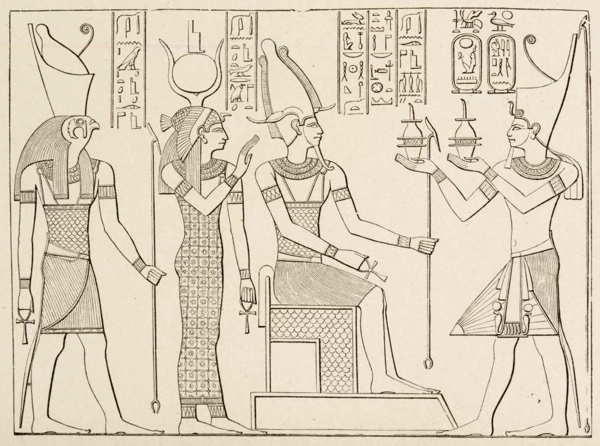The Room of Maat
1. "Hail, phallus of Ra, who departest from thy calamity [that ariseth] through opposition."
"The cycles have been without movement for millions of years."
"I am stronger than the strong, I am mightier than the mighty."
"If I sail away or if I be snatched away to the east through the two horns, or (as others say), "if any evil and abominable thing be done unto me at the feast of the devils, the phallus of Ra shall be swallowed up, along with the head of Osiris." - Book of the Dead, Chapter 93, verses 1-5
2. When the phallus of Ra departs from calamity that arises through opposition, we then liberate ourselves from the four bodies of sin and we enter into the ineffable joy of Nirvana.
3. However, the phallus of Ra and the head of Osiris could lose their power if we fornicate at the demons' bacchanalia.
4. When the human being liberates himself from the four bodies of sin, he enters the room of the double Maat.

The deceased (far left) is judged by the scale of Anubis, then passes Thoth (center, with Ibis head) and brought before Horus, behind whom stand two goddesses Maat (far right, with feathers on their heads)
5. The name of this room is Justice and Truth.
6. There is an inscription on the upper sheet of the door of Maat that states, "Lord of [the Goddess] Maat on his two Feet."
7. The lower sheet of the door is named, "Lord of the double vigor, conqueror of the cattle."
8. Whosoever liberates himself from the four bodies of sin is an imperator of the cosmic mind, a lord of the double vigor, and a conqueror of mortal enemies.
9. In synthesis, this door is named, "Destroyer of the God SHU."
10. This god is our inferior personality who must die within, in order for our interior God to glorify Himself.
11. When the human being liberates himself from the four bodies of sin, he enters the blessed bosom of the Mother Goddess of the world.
12. "Lady of tremblings, with lofty walls, the sovereign lady, the mistress of destruction, who setteth in order the worlds which drive back the whirlwind and the storm, who delivereth from destruction him that travelleth along the way."
13. "Lady of the pylons, lady whom abundant offerings are wade, who giveth whatsoever is there, the guide of the offerings, who gratifieth the gods, who giveth the day for the sailing up of the boat NESHEMENT to ABTU."
14. "She who prevaileth with knives, the mistress of the two lands, who destroyeth the enemies of the Still-Heart, who maketh the decree for the escape of the needy from evil hap."
15. "Lady of splendour, lady of praises, lofty one, NEB-ER-TCHERT, the lady to whom supplications are made and to whom none entereth."
16. "Lady to whom abundant supplications is made....; the difference between whose height and breadth is unknown; the divine image, the strengthener out of the night, being born in the presence of the Still-Heart."
17. "Water flood which clotheth the feeble one weeper for that which she loveth, shrouding the body."
18. "She that belongeth to her lord, the mighty goddess, the gracious one, the lady who giveth birth to the divine form of her lord, or as others say, who passeth through and traverseth [the land], the head [of which] is millions of cubits in depth and in height."
Seti I. Worshipping Osiris, Isis, and Horus.
19. "Blazing flame of Horus which cannot be extinguished, which having passed is followed by another; which is provided with tongues of flame that project to destroy; irresistible and impassable [by any] by reason of the injury which it doeth."
20. "Lofty of gates, who raiseth up those who cry, who art terrible."
21. "She who repeateth slaughters, who burneth up the Fiends, the mistress of every pylon, the lady to whom acclamation is made on the day of hearing iniquity."
22. "She who journeyeth about in the two lands; who destroyeth those who come with flashings and with fire, the lady of splendour; who hearkeneth to the word of the lord every day."
23. "When the company of the gods is led along their hands are [raised in] adoration before her face, and the watery abyss shineth with light by reason of those that are therein."
24. "Mighty one of Souls, red of hair, AAKHABIT, who cometh forth by night; who destroyeth the Fiends in their created forms which their hands give to the Still-Heart in his hour; the one who cometh and goeth."
25. "Lady of valour, destroyer of the ruddy ones, who celebrateth the HEKER festivals [when] the fire is extinguished on the day of hearing [cases of] iniquity."
26. "Lady of victory, whose hand goeth after the Fiends, who burneth with flames of fire when she cometh forth, creator of the mysteries of the earth."
27. "Mighty one in the horizon, lady of the ruddy ones, destroyer in blood, AAKHABIT, power lady of flame.
28. "Lover of flame, pure one, hearkening unto the.... behold [she] loveth to cut off the heads of the venerated ones, lady of the Great House, destroyer of Fiends at eventide."
29. "Dispenser of strength, or as others say, of light, of the palace, the mighty one of the flame, the lady of the strength and of the writings of PTAH himself."
30. "Stone of her lord, field with a serpent, Clother, what she createth she hideth, taking possession of hearts, opener of herself."
31. "Sword that smiteth at the utterance of its own name, goddess with face turned backwards, the unknown one, overthrower of him that draweth nigh to her flame." - Book of the Dead, excerpts from Chapter 145
32. This blessed goddess is Isis, the Mother of the world.
33. She is the goddess of Nature.
34. The entire, immense Nature is the blessed body of this Mother Goddess of the world.
35. When the alchemist liberates himself from the four bodies of sin, he enters the bosom of the blessed Mother Goddess of the world.
36. The negative confession recited by the deceased one before the forty-two gods, who were found in the room of the double Maat, signifies the perfections that the alchemist must acquire in order to liberate himself from the four bodies of sin.
37. This conversation with the gods of the underworld, as it appears in the Book of the Dead, encloses all the esotericism of the fourth great Initiation of Major Mysteries.
38. The deceased one who presents himself before the forty-two judges is the one who has died in order to live for God.
39. We extract the Christ-Mind from the Mental body by means of sexual alchemy.
40. Therefore, the alchemist must not be a slave of the mind.
41. We only extract the beautiful Helen, the divine mind, from the mental organism.
42. We will transcribe "The Negative Confession."
43. This is how it appears in the Book of the Dead:
44. "THE SCRIBE NEBSENI, TRIUMPHANT, SAITH:
45. "Hail, thou whose strides are long, who comest forth from Annu (Heliopolis), I have not done iniquity.
46. "Hail, thou who art embraced by flame, who comest forth from Kher-aha, I have not robbed with violence."
47. "Hail, thou divine Nose (Fenti), who comest forth from, Khemennu (Hermopolis), I have not done violence [to any man].
48. "Hail, thou who eatest shades, who comest forth from the place where the Nile riseth, I have not committed theft.
49. "Hail, Neha-hau, who comest forth from Re-stau, I have not slain man or woman.
50. "Hail, thou double Lion-god, who comest forth from heaven, I have not made light the bushel.
51. "Hail, thou whose two eyes are like flint, who comest forth, from Sekhem (Letopolis), I have not acted deceitfully.
52. "Hail, thou Flame, who comest forth as [thou] goest back, I have not purloined the things which belong unto God.
53. "Hail, thou Crusher of bones, who comest forth from Suten-henen (Heracleopolis), I have not uttered falsehood.
54. "Hail, thou who makest the flame to wax strong, who comest forth from Het-ka-Ptah (Memphis), I have not carried away food.
55. "Hail, Qerti ( i.e., the two sources of the Nile ), who come forth from Amentet, I have not uttered evil words.
56. "Hail, thou whose teeth shine, who comest forth from Ta-she (i.e., the Fayyum ), I have attacked no man.
57. "Hail, thou who dost consume blood, who comest forth from the house of slaughter, I have not killed the beasts [which are the property of God].
58. "Hail, thou who dost consume the entrails, who comest forth from the mabet chamber, I have not acted deceitfully.
59. "Hail, thou god of Right and Truth, who comest forth from the city of double Maati, I have not laid waste the lands which have been ploughed.
60. "Hail, thou who goest backwards, who comest forth from the city of Bast (Bubastis), I have never pried into matters [to make mischief].
61. "Hail, Aati, who comest forth from Annu (Heliopolis), I have not set my mouth in motion [against any man].
62. "Hail, thou who art doubly evil, who comest forth from the nome of Ati, I have not given way to wrath concerning myself without a cause.
63. "Hail, thou serpent Uamenti, who comest forth from the house of slaughter, I have not defiled the wife of a man.
64. "Hail, thou who lookest upon what is brought to him, who comest forth from the Temple of Amsu, I have not committed any sin against purity.
65. "Hail, Chief of the divine Princes, who comest forth from the city of Nehatu, I have not struck fear [into any man].
66. "Hail, Khemi (i.e., Destroyer), who comest forth from the Lake of Kaui, I have not encroached upon [sacred times and seasons].
67. "Hail, thou who orderest speech, who comest forth from Urit, I have not been a man of anger.
68. "Hail, thou Child, who comest forth from the Lake of Heq-at, I have not made myself deaf to the words of right and truth.
69. "Hail, thou disposer of speech, who comest forth from the city of Unes, I have not stirred up strife.
70. "Hail, Basti, who comest forth from the Secret city, I have made no [man] to weep.
71. "Hail, thou whose face is turned backwards, who comest forth from the dwelling, I have not committed acts of impurity, neither have I lain with men.
72. "Hail, Leg of fire, who comest forth from Akhekhu, I have not eaten my heart.
73. "Hail, Kenemti, who comest forth from the city of Kenemet, I have abused [no man].
74. "Hail, thou bringest thine offering, who comest forth from the city of Sau (Sais), I have not acted with violence.
75. "Hail, thou lord of faces, who comest forth from the city of Tchefet, I have not judged hastily.
76. "Hail, thou who givest knowledge, who comest forth from Unth, I have not ........, and I have not taken vengeance upon the god.
77. "Hail, thou lord of two horns, who comest forth from Satiu, I have not multiplied [my] speech overmuch.
78. "Hail, Nefer-Tem, who comest forth from Het-ka-Ptah (Memphis), I have not acted with deceit, and I have not worked wickedness.
79. "Hail, Tem-Sep, who comest forth from Tattu, I have not uttered curses [on the king].
80. "Hail, thou whose heart doth labour, who comest forth from the city Tebti, I have not fouled water.
81. "Hail, Ahi of the water, who comest forth from Nu, I have not made haughty my voice."
82. "Hail, thou who givest commands to mankind, who comest forth from [Sau], I have not cursed the god.
83. "Hail, Neheb-nefert, who comest forth from the Lake of Nefer, I have not behaved with insolence.
84. "Hail, Neheb- kau, who comest forth from [thy] city, I have not sought for distinctions.
85. "Hail, thou whose head is holy, who comest forth from [thy] habitation, I have not increased my Wealth, except with such things that are justly mine own possessions.
86. "Hail, thou who bringest thine own arm, who comest forth from Aukert (underworld), I have not thought scorn of the god who is in my city."
 English
English




